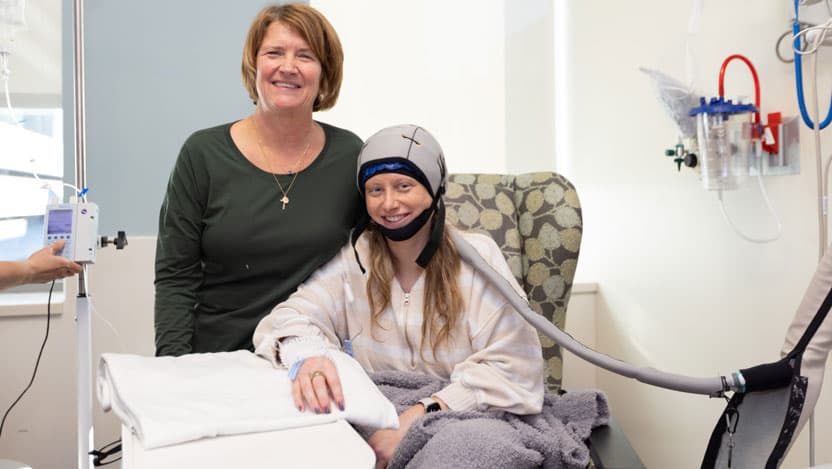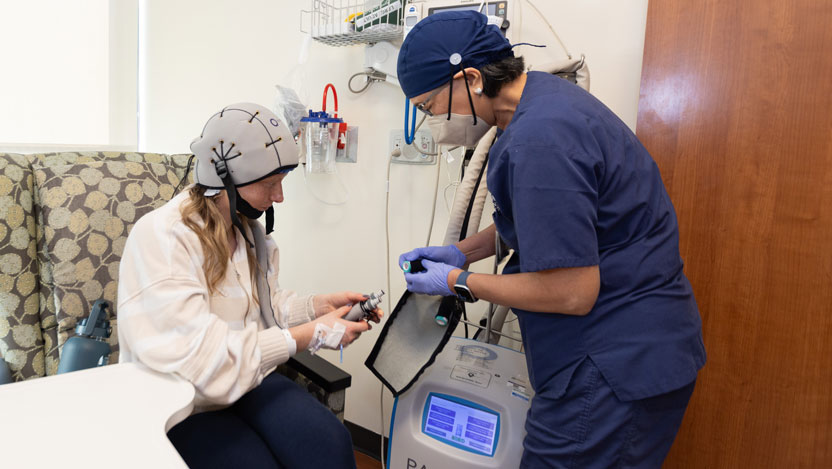Can a 'cold cap' prevent hair loss during chemotherapy?

When Megan Steen learned she needed chemotherapy, her thoughts immediately turned to one thing: her hair.
The 34-year-old, whose wedding was only months away, began researching ways to prevent her hair from falling out, a common chemotherapy side effect.
A hairstylist friend told Steen about an option known as “cold caps” — scalp-cooling helmets that can be worn during chemotherapy to help reduce hair loss.
The helmets maintain a near-freezing temperature to constrict the blood vessels around the wearer’s scalp, making it tougher for the chemotherapy medication to reach and damage hair follicles.
Steen’s oncologist at the University of Chicago Medicine, Nan Chen, MD, cautioned that this approach — which is growing in popularity — doesn’t work for everyone. The results vary based on the type and length of the chemotherapy, she said.
But Steen, a breast cancer patient, decided to give it a shot anyway.
“You can’t control anything when it comes to cancer,” said Steen, who lives in Downers Grove. “But this made me feel like I might have some control.”
How do cold caps for cancer patients work?
There are two types of cold caps on the market.
The one that Steen used is an FDA-approved device that connects to a cooling machine — UChicago Medicine offers this option in its breast cancer center. The machine circulates liquid through the cap to keep its temperature consistent.
The other product is a gel-filled, scalp-cooling cap stored in a freezer or on dry ice. It is not FDA-approved, according to the American Cancer Society.
Cold caps are designed for adults with solid tumor cancers, and they can’t be used for children or people with blood cancer or severe liver problems, the cancer society said.
The caps fit tightly on the head and are worn for anywhere from 15 to 50 minutes before and after each chemotherapy infusion. The process also involves using special shampoos, and washing the hair very gently and carefully.
“It's a whole system,” Chen said. “How well it works may depend on how diligent you are with following this throughout your entire chemotherapy course.”

Are there other ways to save your hair during chemotherapy?
Victoria Barbosa, MD, a UChicago Medicine dermatologist and director of the Hair Loss Program, said there’s not much people can do to prevent hair loss during chemotherapy, and that cold cap success rates vary widely.
“The truth is, it works for some people but not everyone,” she said, noting that they're more effective with certain chemotherapy drugs.
Even if there is significant hair loss, most people’s hair regrows after chemotherapy, Barbosa said. There are several prescription and over-the-counter medications, including minoxidil (Rogaine), that may stimulate hair growth and speed up the process.
“If your hair doesn’t come back, you should make an appointment with a dermatologist to identify if you’ve had chemo-induced scarring alopecia or if you have another underlying scalp condition that needs to be treated,” she said.
Pros and cons of cold capping for hair preservation
At her final chemotherapy treatment in November 2024, Steen estimates she still had 70% of her hair. Her eyebrows and eyelashes had fallen out, but she had no bald spots on her head.
“My hair looks like it normally does,” said Steen, who was thrilled with the results from her cold cap. “It was expensive and the process was tedious … but I would 1,000% do it again.”
Chen makes sure to tell her patients about the pros and cons of cold capping.
“I'm very clear about expectations. Even with a good outcome, you're still going to lose a lot of hair,” Chen said. “But this issue is very, very important to women and I’m glad we have the potential to do something and try to reduce hair loss if we can.”

Nan Chen, MD
Nan Chen, MD, is a board-certified hematologist/oncologist who specializes in comprehensive breast cancer care.
Learn more about Dr. Chen
Victoria Barbosa, MD
Victoria Barbosa, MD, is a board-certified dermatologist. She provides specialized care for a broad range of skin and hair conditions.
Learn more about Dr. Barbosa